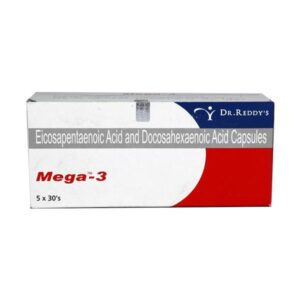EICOSAPENTAENOIC ACID (EPA) + DOCOSAHEXENOIC ACID
Eicosapentaenoic Acid (epa): Eicosapentaenoic Acid (EPA) is a type of omega-3 fatty acid that is primarily found in certain types of fish and seafood. It is commonly used as a dietary supplement or as a component of pharmaceutical preparations.
EPA is known for its anti-inflammatory properties and is used to treat a variety of conditions, including cardiovascular diseases such as hypertriglyceridemia, hypertension, and coronary artery disease. It is also used as an adjunct therapy in the treatment of depression and other mental health disorders.
The exact mechanism of action of EPA is not fully understood, but it is believed to work by reducing the production of inflammatory chemicals in the body, such as prostaglandins and leukotrienes. It does this by competing with arachidonic acid, a precursor to these inflammatory chemicals, and altering the balance of eicosanoids in favor of those with anti-inflammatory effects.
The recommended dose of EPA varies depending on the condition being treated. For cardiovascular diseases, the usual dose ranges from 1 to 4 grams per day. For mental health conditions, higher doses of up to 6 grams per day may be needed. It is important to follow the recommended dosage advice from a healthcare professional, as high doses of EPA can have potential adverse effects.
Common side effects of EPA supplementation are typically mild and include gastrointestinal issues such as diarrhea, nausea, and indigestion. In some cases, high doses of EPA can increase the risk of bleeding, so caution should be exercised in individuals taking blood-thinning medications or with bleeding disorders. EPA should also be used with caution in individuals with fish or shellfish allergies.
Overall, Eicosapentaenoic Acid (EPA) is a beneficial omega-3 fatty acid that can be used as a dietary supplement or as part of medical treatment for various conditions. However, it is important to speak to a healthcare professional before starting EPA supplementation to determine the appropriate dose and to discuss any potential interactions or risks.
Docosahexenoic Acid: Docosahexaenoic Acid (DHA) is an omega-3 fatty acid derived from fish oils. It is an essential nutrient that plays a crucial role in brain development and function. DHA is commonly used as a dietary supplement to ensure adequate intake in individuals with low levels or in those who have difficulty obtaining enough through their diet.
The exact mechanism of action of DHA is still being studied, but it is believed to influence the structure and function of cell membranes, particularly in the brain and retina. DHA is involved in promoting neuroplasticity, enhancing synaptic transmission, reducing inflammation, and supporting overall cognitive function.
The recommended dose of DHA varies depending on age, health condition, and specific needs. For healthy adults, a daily intake ranging from 200 to 500 milligrams is generally recommended. In pregnant and breastfeeding women, supplementation with higher doses (typically around 300-900 mg) may be advised to support fetal and infant brain development.
Common side effects of DHA supplements are usually mild and transient. They may include gastrointestinal symptoms such as belching, diarrhea, or indigestion. DHA is generally well-tolerated, and severe side effects are rare. However, individuals with fish or shellfish allergies should exercise caution when taking DHA supplements, as they may cause an allergic reaction.
It is important to note that DHA supplements should not be seen as a replacement for a healthy and balanced diet. It is always recommended to consult with a healthcare professional or registered dietitian before starting any new supplement regimen.


